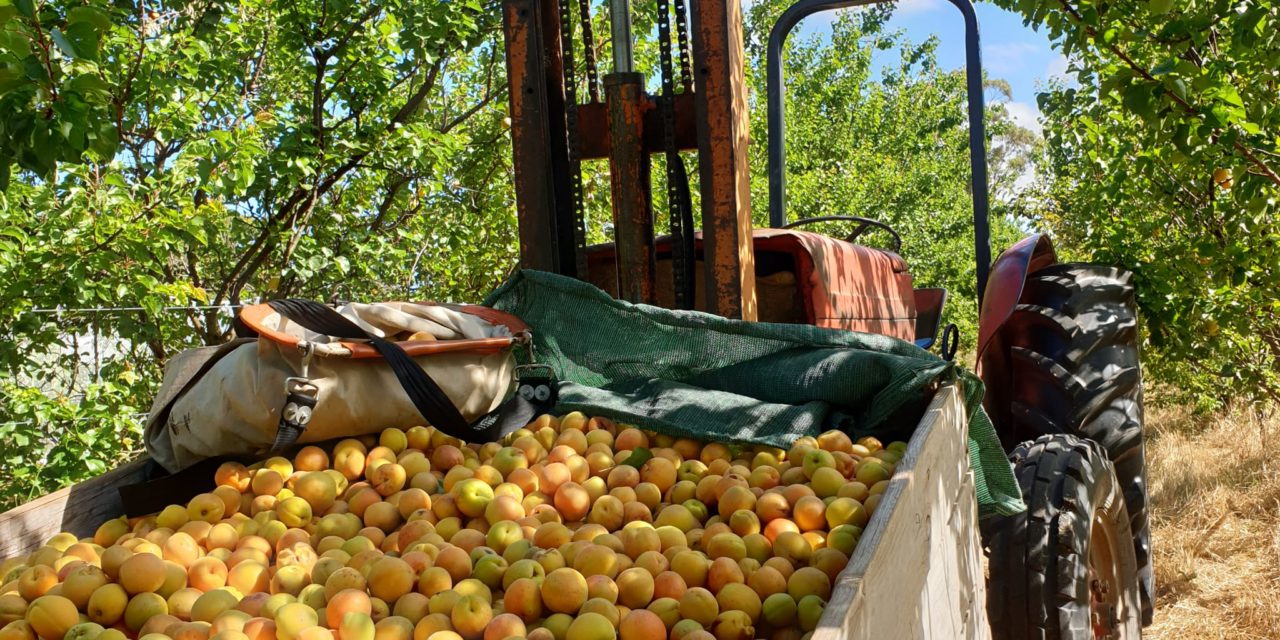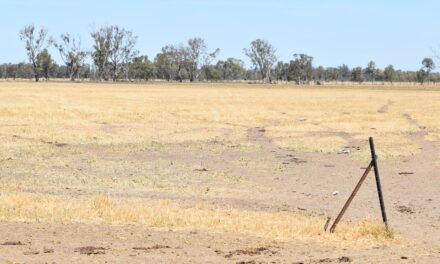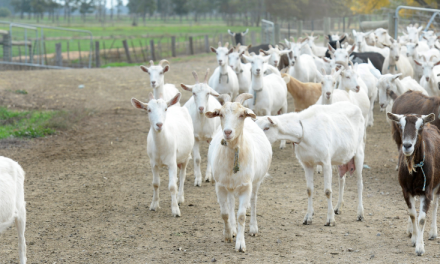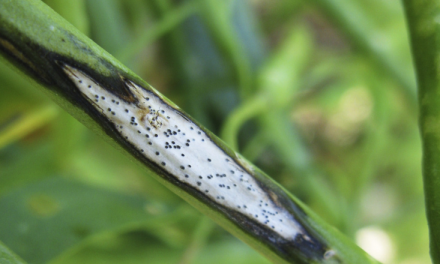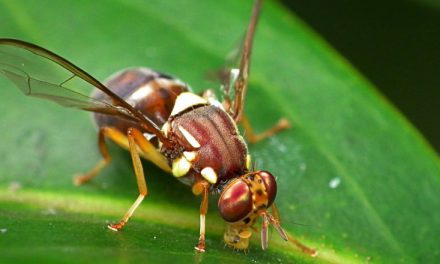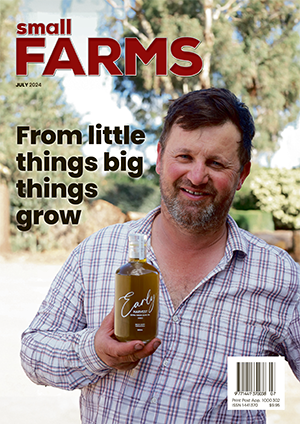Two of them grew up on farms, one of them didn’t — but they are all now on the front-line of farming, albeit on a very small farm. And the trio is determined to make every post a winner as it breathes some life back into what was a food producing area with a long and proud history.
Every member of a threesome that bravely named itself The Orchard Keepers is still wearing L-plates when it comes to being farmers.
Although Frenchman Yoann Le Guen should, truth be told, be on his Ps at the very worst, as he brings a not insignificant slice of European agricultural expertise with him to this most remarkable of farming experiments.
Because he, partner Alex Kelly and their business partner Ingrid Phyland don’t just run their orchard, they are also members of the innovative — even ground-breaking — Harcourt Organic Farming Co-operative (see page 18).
Although that might be temporarily on hold regardless of skill levels — Yoann and Alex have been laid low by COVID-19, and Ingrid, who on the day Small Farms caught up with her was good to go as farm spokeswoman, rang to say she had been called to fetch her two-year-old home from daycare because he had a runny nose.
They have tackled — or been tackled by — a wet season, emerging pests and diseases, including leaf curl and blossom blight affecting crops and, of course, COVID-19.
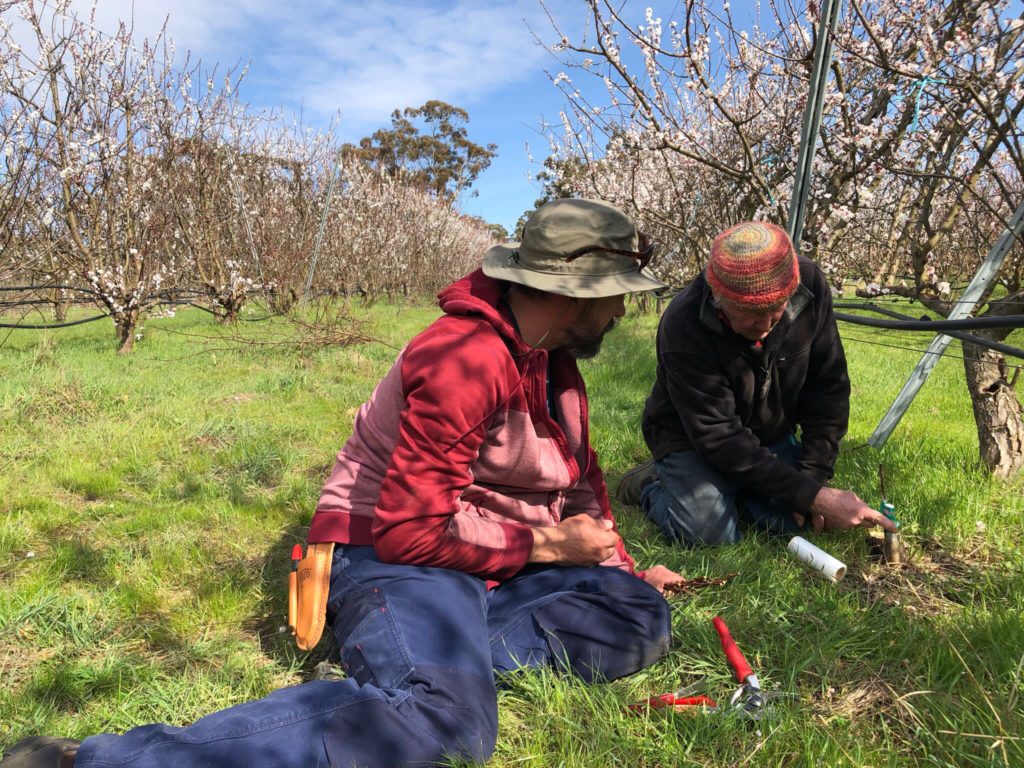
Yoann Le Guen and Merv Carr (Kate Finlay’s father) grafting.
And they haven’t even been at the helm for a year.
Ingrid had no hesitation in saying the decision by the friends to make the move onto the land (even though they don’t live on the property) was one they had never (well, not never, but hardly ever) regretted.
It was as if their lives had been evolving to the point where they, inevitably, would realise they really were farmers, even if they couldn’t see it.
After all, Ingrid was a trained nutritionist and Alex was a film director (although they did grow up on farms), and Yoann was an engineer — but he at least knew what a working farm had to do to stay that way.
“I met Alex as we live close by in Castlemaine and Alex held a neighbours’ gathering that is now an established network on our west side of town, now called West End Resilience,” Ingrid said.
“Having recently moved to Castlemaine, Alex was looking to create connections, and just after the bushfires of 2019 wanted to look at how we could be more resilient as a community of people living close by in the face of climate change.
“Soon after this group had begun to be established COVID emerged and the importance and benefits of the group were realised in terms of looking after those in isolation and ensuring community connection when people were shut off from families, etc.”
So what else would you do when the country is being ravaged by outbreak after outbreak, by lockdown after lockdown, and by endless, ever-changing restrictions and border closures?
Go and take over a farm of course.
One with 4000 fruit trees encompassing 120 varieties of apples, pears, peaches, nectarines, cherries, apricots and plums.
“We took over in July — we really felt we were up for a challenge and an adventure — the property fitted our values being organic,” Ingrid explained.
“We went into it knowing it would be demanding and that we would face a raft of challenges, from climate pressures to insects.
“What made the decision easier was that we had the full support and mentoring from Katie and Hugh Finlay, who own the property and still live on the farm, and knew it would be more demanding because we had to stay organic and many of the fruits we grow, face a raft of challenges from both environment and insects and mildews.
“I think our logo says it all — we debated over whether we would use one hand or three, and while one was a strong statement, three now really works better because by the time any piece of fruit leaves our property each one of us will have seen it at least three times.
“From November to as late as early-to-mid May there is always something happening in the orchard, mostly our very hands-on hand harvesting strategy.”
Each harvest is largely pre-sold through the Community Supported Agriculture project, which sees local customers hand over a year’s expenditure up front, to fund the coming season, and for which they receive their boxes of, in this case, fruit.
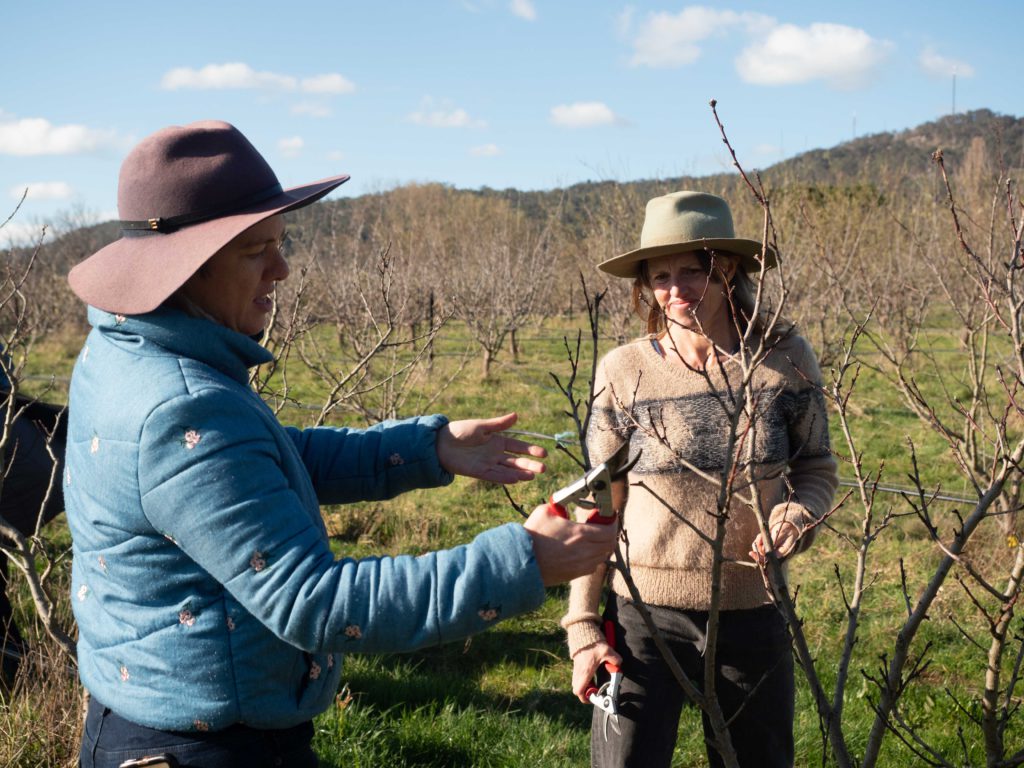
Alex Kelly and Ingrid Phyland navigating pruning.
Under this scheme everyone is invested in the success of the farm, making it more a community project than the traditional scenario of farmers hoping they produce enough quality production to cover the cost of their enterprise and turn a profit.
That is also where there is another major difference between the smaller farms in the Harcourt Organic Farming Co-operative and your bigger farmers.
“The Orchard Keepers is a small collective of friends taking stewardship of an organic orchard on Dja Dja Wurrung Country, in Harcourt, Victoria,” Ingrid said.
“We are humble and see ourselves in a process of long learning about Country and place, our communities and the orchard itself.
“We are driven by a shared commitment to justice, solidarity and care — keeping the principles of food sovereignty, food democracy, adaptation to ecologies and regenerative farming close to our hearts.
“We believe everyone should have access to good healthy food, and we are excited to put that belief into practice.
“We are always looking for ways and make opportunities to bring more justice and more joy to the world around us.
“We aim to be transparent in all that we do, in growing beautiful, healthy food, connecting as closely as possible with the people who buy our fruit all the while looking after each other and this special place.”
The co-operative was founded in 2018 by Katie and Hugh Finlay, who still own the land but couldn’t interest a second generation to run the family farm.
So they developed a plan to lease out their land to a collaboration of young, diverse, organic farmers.
“We follow a long line of folks who have cared for this land and produced delicious food here,” Ingrid said.
“Most recently Ant, who ran the orchard as Tellurian Fruit Gardens, introduced the CSA boxes as well as supporting the establishment of HOFC and the weekly Castlemaine Farmers’ Market.
“It is hard to understate how incredible it is to be passed the baton by such engaged and caring farmers and we hope we can honour their many years of labour here.
“Which brings us to the incredible Katie and Hugh, who started this project at the grassroots level by diversifying their plantings so they could take advantage of the emerging farmers’ market scene to sell their fruit direct to customers.
“And to provide more resilience against the vagaries of the weather and global heating.
“Converting to organic production and becoming certified organic in 2008 was the next big change, and they kept right on going until today, where they have championed young farmers like us to go onto the land without already drowning in debt after borrowing to buy a farm.
“We certainly would not be here without them.”
While it might appear to have the medieval overtones of tenant farmers, Ingrid said it couldn’t be further from the truth, as the Finlays have come up with a farming model where everyone wins.
“We reckon this new way of farming will be good for multi-faceted farmers like Katie and Hugh, who want to step back from active farming but don’t want to sell the family farm, for emerging farmers who want to get started but can’t afford land, and customers who are yearning for a connection to the farmers who produce their food.”
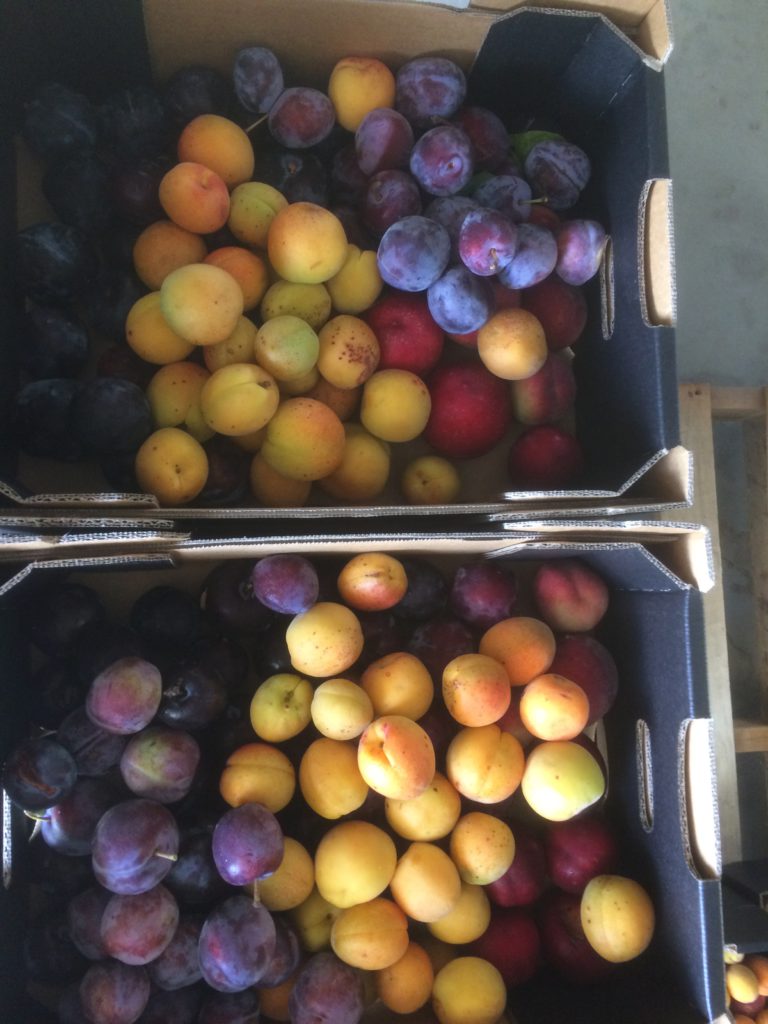
The farm has 4000 fruit trees encompassing 120 varieties of apples, pears, peaches, nectarines, cherries, apricots and plums.
For all their innovation, the rookies still face plenty of traditional farming challenges. In their case — birds, fruit fly, mildew and other diseases, water, climate change and sustainability.
They also all have jobs off-farm — at this stage in their agricultural lives the farming may be sustainable but their incomes are not.
Ingrid works between a job and the farm, as do Alex and Yoann, while Ingrid’s partner, Mal, is totally off-farm.
“Overall, we consider ourselves lucky as we are doing what we love, haven’t gone into debt and we have the safety net of other jobs,” Ingrid said.
“It must have been so sad for the people of Harcourt to watch one family after the other pack up and walk off the land.
“Until Hugh and Katie were one of the last ones standing.”
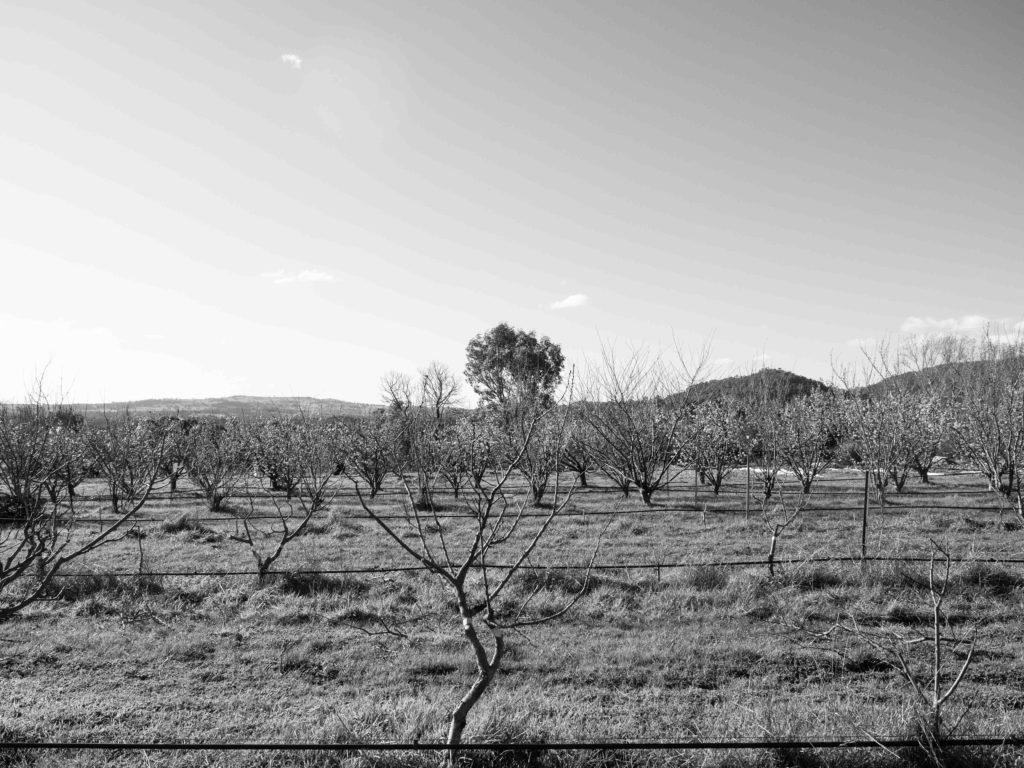
The orchard with Leanganook in the background as it looked when The Orchard Keepers started.

